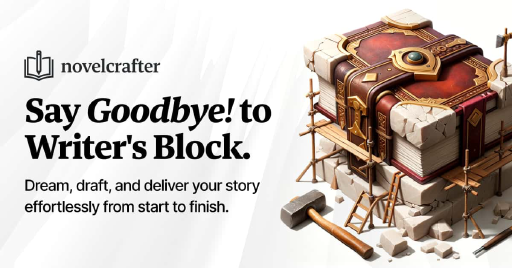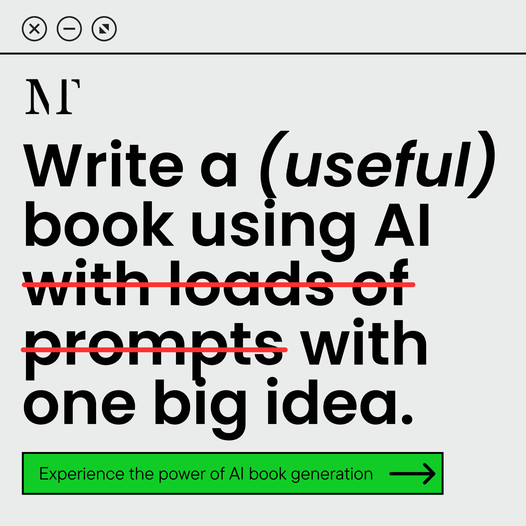Writing with a Little Help from AI
Plugging AI into the world of writing is shaking things up for storytellers and wordsmiths everywhere. Authors are finding new ways to polish their skills and crank up their productivity. Let’s peek into how AI is lending a helping hand to writers.
How AI Perks Up Writing
Writers on the hustle find AI tools like a godsend. These digital buddies help slice away time usually spent pumping out words, which is gold when deadlines loom. Picture this—you ask an AI to whip up parts of your novel and, boom, you’ve got material in minutes, not hours. A lifesaver for marketeers, small businesses, or anyone needing to churn out content without diving through endless drafts.
Then there’s the dreaded writer’s block—AI to the rescue again! It dishes out outlines and key talking points, transforming that intimidating blank page into something manageable. No more staring into the abyss, hoping for inspiration to strike.
| Playground of Writing with AI | What’s in the Mix? |
|---|---|
| Zip-through Writing | Content comes quick, speeding up your mojo. |
| Busts Writer’s Block | Offers ideas and snazzy kick-offs to get your brain gears turning. |
| Wallet-Friendly | Keeps the cost low by slashing the need for hiring more pen-pushers. |
How AI Powers Up Your Writing
AI’s powerhouse capabilities are giving writers more bang for their buck. We’re talking about spitting out loads of content rapidly, meaning a writer can bump up how much they produce in a big way. Imagine trimming a book’s completion timeline from what felt like forever to just a couple of weeks. That’s the magic of using AI co-pilots.
Beyond just spitting words, these smart tools take a load off by managing repetitive chores. Writers can then zero in on crafting compelling characters or twisting up plots, leaving the nitty-gritty draft details to the bots. This lets storytellers inject more heart into their tales and dream up richer narratives.
With AI upping the game, authors find ways to pump out more stories without burning out, all at record speeds. The efficiency and creativity boost isn’t just a lucky side-effect; it’s a game plan. As platforms like novelcrafter writing software become the new norm, the sky’s the limit for what stories can become.
Embracing AI in writing breaks new ground, creating fresh ways for writers to shine bright in the bustling book world. Authors using these tools are set to lead the charge, ensuring their stories roll out ahead of the pack amid an ever-changing literary scene.
SEO and AI Writing
AI writing tools have switched up how authors tackle website optimization and content creation. With AI in their corner, writers can boost their SEO game and tweak their work to cozy up to search engine algorithms.
Sprucing Up SEO with AI
AI writing isn’t just about spinning tales; it can seriously up a piece’s SEO game. These AI gizmos dive into oceans of online info to pluck out gold nugget keywords and phrases, shooting your work into the search engine stratosphere. That’s a big deal for authors hustling their stuff online. Check out TechTarget, where they’ve got the lowdown on how these tools can flag keywords that make content pop up more often.
| Benefit of AI in SEO | What’s the Deal? |
|---|---|
| Keyword Magic | AI sniffs out top-tier keywords from what everyone’s buzzing about. |
| Smoothing Content | AI jazzes up structure and style for slick readability and engagement. |
| Brainy Insights | AI scopes out the competition and reader habits to finetune strategies. |
Authors keen on riding this wave might want to peek at tools like novelcrafter writing software, mixing SEO savvy right into the writing routine.
 What Poetry Feels Like
What Poetry Feels LikeHow Google Sees AI Content
Google’s keeping an eye on AI-written stuff and has rules to keep search results genuine. With tweaks to its ranking whatchamacallits in August 2022 and again in March 2024, Google’s big on user-friendly and informed content. They frown on tricks that use shoddy, SEO-only content to climb rankings (TechTarget).
Authors must make sure their material is both authentic and enriching. Google’s got algorithms that favor thoughtful and top-notch content that meets what users are after. AI helpers can squash writer’s block, spit out outlined ideas, and speed up crafting great content. But don’t nod off when it comes to keeping the originality and core message, especially with chatter about plagiarism (PublishDrive).
Getting creative while hugging those SEO ropes means sticking to Google’s guidelines. With tools like ai writing assistant for authors and best tools for fiction authors, writers can get support with both churning out content and beefing up SEO tactics.
Ethical Considerations
AI-assisted writing tools bring a bunch of goodies to authors, but they also stir up some serious ethical questions. Here, let’s chew over the link between AI and academic honesty, along with what part it’s playing in education these days.
Academic Integrity and AI
A big worry in schools and colleges is students turning in AI-generated essays as their own work. That’s crossing the line and goes against what educational institutions stand by—namely, honesty and straight-up integrity. It’s on instructors to tackle these issues, teaching students the pros and cons of AI tools while hammering home the idea that they’re responsible for what they hand in (Center for Teaching Excellence – University of Kansas).
Opinions are all over the map about how much AI should chip in on schoolwork, and it can vary from one field of study to another. Teachers might not see eye to eye on what counts as okay help from AI. Plus, with these tech advancements, it’s high time to rethink some long-standing questions about academic honesty that go beyond just AI (Center for Teaching Excellence – University of Kansas).
AI in Education
AI’s got a shot at becoming a big player in classrooms and universities. For those struggling with getting started, AI can give a nudge by providing structured outlines and insights needed for essays or articles, which is a lifesaver when deadlines loom.
With schools starting to include AI in the mix, educators are nudged to nurture environments that prioritize genuine learning and honesty. It’s not just about addressing the ethical side of using AI; it’s about kickstarting a culture where students uphold integrity. Encouraging students to tweak and put their spin on AI-generated ideas helps deepen their grasp of writing and making content.
AI tools aren’t here to replace someone’s thoughts and creativity; they’re here to boost them. Using AI responsibly in education doesn’t just benefit students or writers; it keeps writing a genuine reflection of personal effort while embracing technology’s perks without ditching ethical values.
Creativity and AI
AI in Creative Processes
AI is like your creative sidekick, stepping in to handle the boring stuff so you can dive into the fun bits. Generative AI gets the limelight here, helping authors and creators skip mundane chores, letting their imaginations really shine. Think of it like artists teaming up with gadgets like Stable Diffusion and DALL-E 2, shaking up what we think of as ‘authorship’ (JSTOR Daily).
Writers aren’t left out either – AI throws ideas their way, sketches out plotlines, and throws in some character tips. AI writing tools can totally boost the originality and grip of stories. Research even hints that when writers bat around AI’s creative pitches, they churn out better tales, especially when AI’s throwing them a bunch of ideas (PMC).
Through AI, writers can get fresh angles on story planning and brainstorming, sparking ideas they might’ve never thought up themselves. This team effort means more colorful and inventive creative work, adding layers and perspectives to the writing process.
The Role of AI for Artists
AI for artists, including authors and visual creators, isn’t about replacing them but giving them a turbo boost. Sure, AI can whip up illustrations or conjure wild narrative tricks that might take humans ages to master. But don’t worry – it’s all about supporting creativity, not overshadowing it (JSTOR Daily).
Artists are now waking up to the fact that AI can supercharge their efforts, helping them stumble upon fresh creative paths. AI opens the door to trying out new styles or formats, pushing their creativity further. The rules of ethics are huge here – while AI might make things easier, it’s crucial to keep human creativity as the main act.
For writers, using tools like Novelcrafter can streamline their storytelling with features specially geared for character growth, plot detailing, and world expansion. This tool offers a full package for weaving fascinating stories while embracing AI’s power.
AI’s involvement means partnership over rivalry in creativity, reinforcing the truth that human ingenuity is unmatched. This teamwork allows both artists and writers to stretch their limits and crank out more groundbreaking creations.
Pitfalls of AI Writing
AI writing might be the shiny new toy in town, but it’s fraught with hurdles that writers need to consider. Let’s face it, just because it can crank out text doesn’t mean it’s free from goof-ups or limits.
Accuracy of AI Content
One pesky issue with AI-generated scribbles is its knack for bending facts. Sure, your sentences might be polished as grandma’s silverware, but the facts could be pure fiction. Case in point: An AI once penned an article on testosterone’s role in men’s health that was more fiction than fact, throwing shade on AI’s trustworthiness.
On platforms like Reddit, AI bots toss out responses that seem smart yet are often a pile of errors. Take the blunder about the song “A Whiter Shade of Pale,” where the AI spun a tale with more holes than Swiss cheese. So, whenever AI’s involved, triple-check those details like your life depends on it.
Limitations of AI Writing Tools
Then there’s the question of output quality. Google’s got a thing for Experience, Expertise, Authoritativeness, and Trustworthiness (EEAT), but AI can sometimes miss the boat. It might be entertaining, but does it hit the mark on standards? Not always.
And here’s the kicker: originality takes a dive. AI regurgitates info from the interwebs, which means it might accidentally churn out something copied or stale. Students using AI for homework should keep ethics in mind — no one’s excusing tech-enabled shortcuts.
Yet, amidst these quirks, AI’s got potential. It’s like salt in your stew — toss it in to enhance, but don’t let it take over. Writers mixing in AI’s efficiency with their own flair can whip up some hits. For those wanting the scoop on blending AI in writing, check out our guide on the best tools for fiction authors.
Future of AI in Writing
The way we approach writing has seen remarkable changes lately, thanks to AI tech shaking things up. Writers now have some fresh help in areas they never imagined. Let’s peek into what’s happening with AI writing tools and how they’re fitting into the world of publishing.
AI Writing Tools Advancements
AI writing tools have taken a leap forward, giving writers new tricks to play with. Take Sudowrite, for instance—it helps storytellers dream up ideas, sort their plots, and even shape the worlds they create. These tools are made to be straightforward, kind of like a helpful sidekick, guiding writers without the fuss.
In a time where interesting content makes all the difference, tools like Grammarly are keeping an eye on clarity and flair, making sure everything reads smoothly and sticks in our minds. Despite these advancements, human editors remain critical, ensuring content connects with folks out there (PublishDrive).
| AI Tool | What’s Up | Perfect For |
|---|---|---|
| Sudowrite | Dreaming up ideas, plots, world-building | Novel writing |
| Grammarly | Clarity checks and style tweaks | Content sprucing |
| ChatGPT | Brainstorming anything and everything | Various writing needs |
| Midjourney | Creating visuals | Making things look great |
With such tools, writers can stretch their imagination beyond the usual and spin stories in a much more efficient way.
Integration of AI in Publishing
AI is not just for the writing part—it’s also shaking up how publishing works. Bringing in AI into the mix makes the shift from a draft to a finished product way smoother for authors, regardless of how seasoned they are (PublishDrive).
Authors can take advantage of AI-assisted platforms to polish their manuscripts, ensuring their work gets a thumbs-up from industry standards. AI-driven marketing tools also lend a hand in understanding what readers want and fine-tuning promo strategies.
Blending AI with writing and publishing simplifies the grind, letting writers focus on what they do best while boosting productivity. From brainstorming to hitting publish, AI is there all the way, sprucing up every step of the process.
As technology progresses, writers searching for AI-assisted novel writing will find plentiful resources to nurture their creative passion and thrive in an ever-busy literary scene.


 Grab my poetry book, 'we're all just wanderers in the end' Here
Grab my poetry book, 'we're all just wanderers in the end' Here AD: Your Book Finally Written...
AD: Your Book Finally Written...